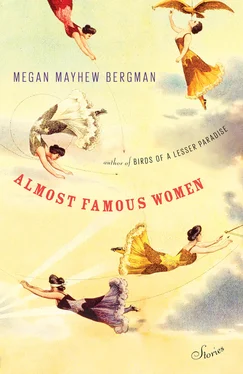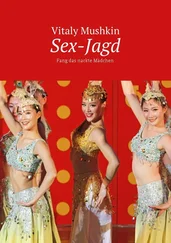“And E major for Mum,” Vincent says, unleashing a note that becomes a cloud of breath in the air.
“Mum will have to be offstage left,” Norma says, thinking of Cora’s tendency to jockey for a role onstage. She looks up at the wan sky, then into the golden insides of a café with a green awning. She imagines a steaming hot cup of coffee and a pastry, but there’s no money for pastries, just a big lunch at Polly Holladay’s.
Her pace, and then Vincent’s, quickens, probably because they’re talking about Cora. She’s the one topic capable of dividing them, and they both tend to get anxious when she comes up. Taking a longer stride causes the backs of Norma’s shoes to rub against her heels and she winces. Vincent had called her to New York in a letter, saying, “We’ll open our oysters together.” But Cora had come too.
“We can’t just put Mum on the shelf,” Vincent says, dodging a lamppost. “You know that.”
Norma nods, though she’s ready to be young and free in the city, and Vincent’s extreme loyalty to their mother baffles her.
“We’ll all be offstage,” Vincent says. “Heard but not seen.”
“Fine,” Norma says, not wanting to fight.
At night, in their cramped apartment, Cora peers over her small spectacles and refuses to drift out of young conversation like most women her age. “I, too, slept around if it suited me,” she announced one evening at dinner, a candlelit meal over a rickety table that included one of Vincent’s literary suitors, a kind but unathletic man who couldn’t hide his shock. “Why shouldn’t my girls do the same?” Cora continued, nonchalant.
Norma was embarrassed, but not surprised, while Vincent laughed heartily and poured her mother another glass of wine.
Vincent is the sun they orbit now, not quite a mother figure but a revered one. One night, when they’d been drinking, she asked Norma to sweep the kitchen.
“I always clean the kitchen.”
“Oh don’t be revisionist. We all cleaned the kitchen growing up.”
“Who do you think kept house when you went off to Vassar?”
“Tell me,” Vincent said, pausing in the doorway, owning every inch of her five-foot frame. “What kind of ride is it, on my coattails? Is it good?”
In the morning, Vincent groveled, but Norma waved her off. We’re all hustlers, she thought. I may have come into the theater on Vincent’s coattails, but I’ve stayed because I’m damn good at what I do.
Norma has held a gun, silhouetted onstage, lights dark. She’s been a mermaid, then a barmaid, in Djuna Barnes’s Kurzy of the Sea , taken direction from Eugene O’Neill, when he’s sober enough to give it. She’s delivered a monologue in a subterranean city of the future in a costume shaped like a pyramid, a halo over her head dangling from a well-bent wire. She’s been the highlight of a bad production, a critic writing, “Even Norma Millay’s superb acting couldn’t save this show…”
And Charlie — Charlie has seen her talent. Dear, grumpy Charlie, who acts but just wants to paint, even though in her heart of hearts she believes he isn’t as talented as he thinks; are any of them? But that’s part of his charm, the vulnerability packed alongside the swagger and hot temper.
If Charlie is busy tonight, or in a foul mood, or painting, she thinks, I’ll go home and share a bed with Vince and Mum.
When she’s standing on the stage it’s easy to believe that she’s nearly famous, that she has achieved something, but there are times, like during a half-empty matinee, when the gig feels insignificant. Groundbreaking or not, they are, after all, a troupe that began in a neglected fishing shack that smelled of rotted wood and dead cod.
Later that night, snow hurls itself against their barred window in the Village, while Norma covers her head with a pillow to drown out Cora’s snoring and the sound of Vincent making love to a poet in the kitchen. “Renounce me,” she can hear Vincent saying. “Renounce me.”
ACT III
“Plumblossom, I need you to be brave,” Vincent slurs. “Hurry the hell up!”
They’re on the screened-in porch at Steepletop, and Vincent is agitated and starting to loosen the waistband of her trousers. The flies hurl themselves at the lanterns; Vincent’s farm doesn’t have electricity and is surrounded by impenetrable darkness on nights when the moon is small. The sisters have eaten what feels like their weight in blueberries, swum naked in the pool made out of the stone barn foundation, and downed two bottles of wine. Vincent’s husband, Eugen, is passed out on the couch inside, and she’s thumping a syringe of morphine with expert hands.
“I don’t want to,” Norma says, crushing her eyes shut. “This isn’t good for you.”
“You’ll do it,” Vincent says, exposing the white flesh of her backside. “Hunk, I need you to do it. Who cares how we raise the devil?”
Vincent has burned through more than one advance, clutches her stomach constantly, complains of her guts aching, and washes her meals down with gin, wine, anything. She still packs auditoriums for her readings, but if they could only see the track marks on her legs, Norma thinks.
“How can you turn your back on me?” Vincent says. “After everything I’ve done for you?”
“Just tell me how much,” Norma says, sighing, throwing up her hands. “Though I feel like you’re asking me to kill you.”
“I’ll die if you don’t do it,” Vincent says, “and that’s the truth. I won’t use caution. I’ll plunge a syringe into both thighs.”
“You won’t.”
“Are you daring me?”
“Just use the damn syringe, Hunk.”
“Write down the dose in the notebook,” Vincent says, nodding to one on a glass table nearby.
Norma can see the lucidity in her eyes slipping away, but the imperial quality is still there. When Norma looks at the notebook she’s horrified by the entries, morphine on the hour some nights. Vincent’s cheeks already look flaccid, the whites of her eyes yellowed.
Perhaps Cora knows how bad things have gotten, but Cora is in Camden now, feeble and focused on her own writing, children’s books and verses. And Kathleen is paranoid, and not to be trusted. No, this is my secret to keep with Eugen, she thinks, though anyone seeing Vincent now would know the truth.
“Don’t look at me with compassion,” Vincent mumbles in a harsh, dry voice as she reclines on the divan she keeps out on the porch. “I don’t want it.”
Norma sits on the cool, hard floor and leans against the wicker base of the divan. Vincent reaches for her hand, and she gives it, and when she wakes in the early morning, her shoulder socket aches from reaching up for so long. In the early hours, when the sun is coming up and before the birds have started singing, Norma walks to the guest cottage and climbs in the single bed with Charlie, keeping the windows open. Startled by the roar of an engine, she wakes in time to see Eugen and Vincent speeding down the dirt road, top down, raccoon coats on to take the chill off the morning, her sister’s hair raised by the wind.
They’re going to town, perhaps, and it’s understood that Norma should feed the dogs and horses. It is understood that she might pluck a tomato and eat it for dinner alongside some fresh eggs. It is understood that she should sense where she is needed and assist, and not drink the last of the wine.
ACT IV
A storm comes, and Norma must close up the big white barn across from the house. Her long white hair trails behind her as she runs across the damp grass in her yellow raincoat. The rain clouds her black, horn-rimmed glasses. A dark sedan is coming down the dirt road — no one comes down this road unless they’re looking for her — Steepletop belongs to her now.
Читать дальше












